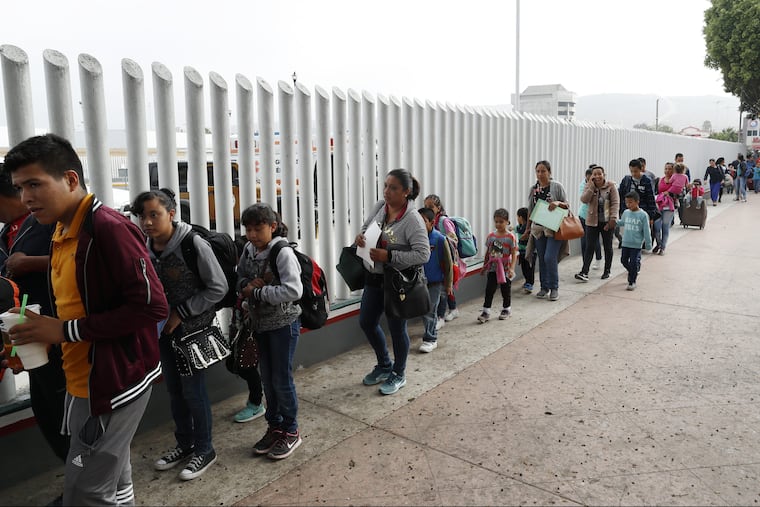Turning away domestic-violence survivors is a dangerous decision for America | Opinion
Attorney General Jeff Sessions reversed a previous ruling that had granted asylum to a woman on grounds of her being a victim of domestic abuse.

A 15-year-old girl was walking home from school in Mexico when she was kidnapped and raped by a stranger. Her parents reported the crime to the police, who told them she should marry her attacker.
A pregnant Honduran woman was arguing with her husband, a gang member and associate of the local police. He shoved her through a glass table, leaving her body slashed and bleeding. When she tried to seek medical help, he blocked the door, pointing a loaded gun at her face.
In June, the United States sentenced these women, and thousands more like them, to die.
We did this when Attorney General Jeff Sessions reversed a previous ruling that had granted asylum to a woman on grounds of her being a victim of domestic abuse. He declared that intimate partner violence represents "private violence" rather than state-sanctioned persecution, and that "the asylum statute does not provide redress for all misfortune."
>> READ MORE: Jeff Sessions' asylum decision hurts women most in need | Christine Flowers
This decision is as dangerous as it is morally repugnant. Not only does the term private violence reflect the deadly idea that domestic abuse is a family matter, but it is a wholly inadequate way to describe the ubiquitous oppression under which women live around the world — oppression so inescapable that it drives them to flee from their home countries.
When violence against women is rampant and well-documented, and governments are unwilling or unable to intervene, it is not a "private" issue— it is a systemic one.
I know this because I manage a clinic that provides medical evaluations to asylum-seekers in Philadelphia. Unlike refugees, who are brought to the U.S. from nations where they are subject to persecution, asylum-seekers have already arrived here and are applying to stay. To be granted asylum, they must show they have been, or fear they will be, victims of persecution in their home countries.
In their evaluations, survivors of domestic violence display physical and emotional scars that corroborate their stories. They have cuts, infections, and cigarette burns. They have disfigured, arthritic joints from untreated broken bones. They express hopelessness and guilt, and describe vivid flashbacks to their abuse: telltale signs of depression and post-traumatic stress disorder.
In recent years, the makeup of asylum-seekers in the United States has shifted. There has been a sharp increase in applicants from Latin America, particularly El Salvador, Honduras, and Guatemala, including women fleeing gender violence. And many have been successful: in 2014, then-Attorney General Eric Holder ruled that intimate partner violence was grounds for asylum, and in subsequent years the approval rate for those nations tripled.
This happened with good reason. In 2017, the United Nations deemed Latin America the most dangerous place in the world for women — in Guatemala, a woman is murdered every 12 hours. A large number of these murders are committed by partners or family members living in the home.
In most cases of femicide, murder is not the first act of violence — it starts with verbal and physical abuse. But for most abused women, leaving their partners is not an option. Many have children, and lack the resources to be single mothers.
Those who report to the police do not fare better. Frequently, police refuse to get involved, preferentially believing men's accounts or saying such issues should be handled in the home. When abusers are involved in drug or gang activity, police may be too frightened to intervene, or involved in those crimes themselves. This renders women prisoners in the homes of their abusers, who continue to victimize them without fear of repercussions.
It is important to note that these women are victims of violence, and not perpetrators. Despite the Trump administration's rhetoric, numerous studies have shown that immigrants, including asylees, commit crimes at far lower rates than natural-born Americans. Like the overwhelming majority of asylees, these women work, pay taxes, and follow the law.
The new policy is a needless, heartless declaration of war on one of the world's most vulnerable populations. It will not make America safer or richer. But it will drive thousands of women back into the homes of their abusers — effectively, for many, to their deaths. Violence against women is not mere "misfortune" — it is systemic persecution of a group stripped of the legal or political means to fight back. It should be treated as such under asylum law.
Leigh Finnegan is a fourth-year medical student and executive director of the Philadelphia Human Rights Clinic.